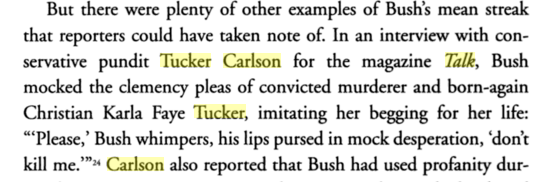by Corey Robin on March 5, 2016
I’m writing a much longer piece on Trump. In the meantime, some clips from the cutting-room floor.
1. At last night’s debate, Trump said of Rubio, “And he referred to my hands—if they are small, something else must be small—I guarantee you there’s no problem. I guarantee you.” Lest you think we’re tumbling down a new rabbit hole here, once upon a time, the king’s body and the body politic were thought to be, if not one and the same, then in some kind of alignment. Trump’s reference is as much pre-modern as it is post-modern. Ernst Kantorowicz’s classic book on the topic, The King’s Two Bodies, was subtitled “A Study in Medieval Political Theology.”
In any event, I’d rather hear Trump’s opinions about his penis than his views on Muslims and Mexicans.
2. You often hear that the rhetorical brutality of Trump is unprecedented. Never before have we seen a candidate so cruel. I’m not so sure.

You also hear that we’ve never had a leading politician who so shamelessly, if rhetorically, flirted with violence. Again, I’m not so sure. [click to continue…]
by John Holbo on March 5, 2016
This Dahlia Lithwick piece on the Supreme Court abortion case, Whole Woman’s Health v Hellerstedt, is interesting in itself, and suggestive for the near future. We have an even 4-4 conservative-liberal split on the court but Thomas doesn’t talk, and Roberts, the Chief, regards it as his duty to be Chief. Roberts seems to care about being remembered as an effective Chief Justice more than he cares about being remembered as a reliable ideological partisan (like Scalia); this significantly constrains his self-presentation in oral argument. Anthony Kennedy is – Anthony Kennedy. Libertarian, hence mostly conservative, in that idiosyncratically reliable way of his. That leaves Alito, the rock-ribbed Republican voice on the court, if you will. On the other hand, we have Breyer-Kagan-Sotomayor-Ginsburg. Their collective partisan profile is moderate-left Democrat. They are much more judicially restrained than, say, Scalia. But the very fact that they do not espouse philosophically extremist positions – they are not judicial philosophical activists, to coin a phrase – means there are fewer cross-currents and counter-currents within their overall, moderate-left flow. They aren’t going to make bold, contrarian leaps; they’ll keep right on saying moderately liberal things, more or less in unison.
So we may see more cases in which the oral optics (pardon a synaesthetically mixed metaphor!) are: Republican Party (Alito) double, triple or even quadruple-teamed by the Democratic Party. Oral argument isn’t voting. It’s still 4-4 for voting, most days. I doubt Clarence Thomas is going to start voting with the liberals, even if he sees liberals dominating oral argument. I also don’t suppose Roberts will stand for seeing his partisan side being out-talked in some dramatic way. But his position constrains him. Possibly we will be hearing more from Thomas. That would be interesting, to say the least.
Scalia always had enough oral argument in him for any three Justices. Now it occurs to me that might have been literally the case.
I don’t really have a good sense about how the dynamics of oral argument feed into the obviously much more extensive, behind closed doors activities that result in decisions. But I’m sure it means something, if the character of oral argument shifts dramatically. What do you think?
